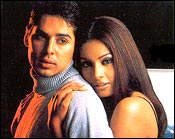
|
Rescue Bollywood!
Are producers willing to pull the industry from the pit it has fallen into?
|
Deepa Gahlot
Why?
This is the first question that comes to mind after watching Sohail Khan's Maine Dil Tujhko Diya. Why should anyone want to waste their time making a film on a subject as worn out as the heel of a tramp's chappal?
Romance between a rich boy/girl and a poor girl/boy going through a storm due to recalcitrant parent/ adverse circumstances/ wicked rival/ family feuds has been done to death. It ought to have gone out of fashion now, like those revenge dramas or lost-and-found yarns that were a rage.
If you ask young urban audiences at whom these fashion-parades-in-the-guise-of-films are aimed, they would say well, who the heck gets married at college? Unless there is daddy's (or mummy's) business waiting, every teenager has to think of completing education, decide on a career, get a decent job and a pad of their own before they consider marriage. Parents' approval comes way down in the list of hurdles.
Even considering that most of our film plots are plagiarised from old Hindi, Southern or Hollywood films, MDTD was amazingly unimaginative. But then if the alternative is the Hitchcock rip-off Soch, or the Ram Gopal Varma rip-off Chhal or the tacky Ankhiyon Se Goli Maare, what is the audience to do but stay away from moviehalls?
Suddenly, producers wake up to the fact that the industry is teetering on the brink of collapse, and what do they do? Pick on the easiest target, the media. Industry organisations decree: don't give star ratings, don't reveal box-office percentages, don't discuss the film's demerits on television, don't let reviews appear on the first day/week of the films' release, don't let too many promos appear on television... Don't, don't, don't.
All this while, filmmakers looked at reviews with contempt and quip, 'Who cares for reviews? We make films for the masses.' So, how come now reviews have become the villains when films plummet like rotten fruit? Filmmakers and actors happily appear on television promos, distribute clips and electronic kits when a film is up for release. How come that is a deterrent for audiences?
Filmmakers will not control star prices, streamline budgets, professionalise the filmmaking process. They will not take the trouble to think up fresh ideas and commission good scripts. But they will waste a lot of time, money and lung power trying to find a scapegoat for their own failure to make watchable/ successful films.
 It is amazing how Hindi film producers are amazing copycats. One hit engenders a rash of me-too imitations. Take the recent hit Raaz. Every producer dropped their family dramas, campus love stories and tapori gangster plots to start on supernatural thrillers. Then, when Awara Paagal Deewana did well, they all wanted to make 'comedy thrillers'. And when Humraaz opened well, there were producers who were scouting for husband-wife-other-man thrillers. All this is true!
It is amazing how Hindi film producers are amazing copycats. One hit engenders a rash of me-too imitations. Take the recent hit Raaz. Every producer dropped their family dramas, campus love stories and tapori gangster plots to start on supernatural thrillers. Then, when Awara Paagal Deewana did well, they all wanted to make 'comedy thrillers'. And when Humraaz opened well, there were producers who were scouting for husband-wife-other-man thrillers. All this is true!
What they do not realise is that a handful of films that click well do so because they have something slightly different to offer. Now if a filmmaker or actor says their film is hatke, people laugh. That is sure indication, if any, that it is hackneyed as hell.
When they make this hatke film and audiences stay miles away, can anyone blame them? Or bad reviews, for that matter?
What filmmakers need to do is damage control before the film is made. The amount of money wasted on making rehashes of rehashes of dud films nobody wants to see is criminal. Since our industry does not have the multi-layered system of commissioning, optioning novels/plays, writing, rewriting, scrutinising scripts that studios in the West do, producers should set up committees to read and approve of scripts before a film goes on the floor.
Naturally, that would mean professional level scripts will have to be written first. The decision of the committee need not be binding on the producer: if they want to make rich girl-poor boy campus romances, they are welcome to do so. But at least a halfway aware producer will have some idea beforehand if he/she has a workable script in hand. It would, of course, be imperative that producers make a pact not to filch other people's plots and respect intellectual property.
 Now, anyone who makes and anyone who views a film knows that a great script does not always translate into a great film. Sometimes a great film can be made out of a bad or nonexistent script. However, keeping the variables and the imponderables in mind, there are chances that a good script will make a good film --- it is the foundation on which the structure of the film will be erected, and a collapse is avoidable if the base is strong.
Now, anyone who makes and anyone who views a film knows that a great script does not always translate into a great film. Sometimes a great film can be made out of a bad or nonexistent script. However, keeping the variables and the imponderables in mind, there are chances that a good script will make a good film --- it is the foundation on which the structure of the film will be erected, and a collapse is avoidable if the base is strong.
The people on the committees could be filmmakers with a proven track record, writers, critics, novelists, and whoever else is interested in rescuing the industry from the pit into which it has fallen. Are the producers willing to get together to take concrete steps to pull it out?
E-mail Deepa Gahlot